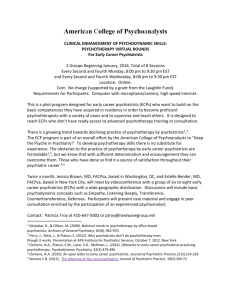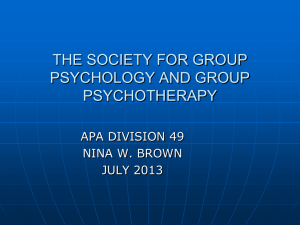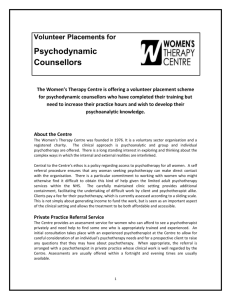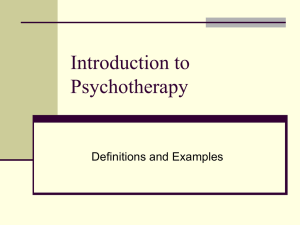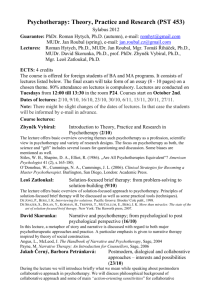Psychotherapy KSS Induction Aug 2014
advertisement
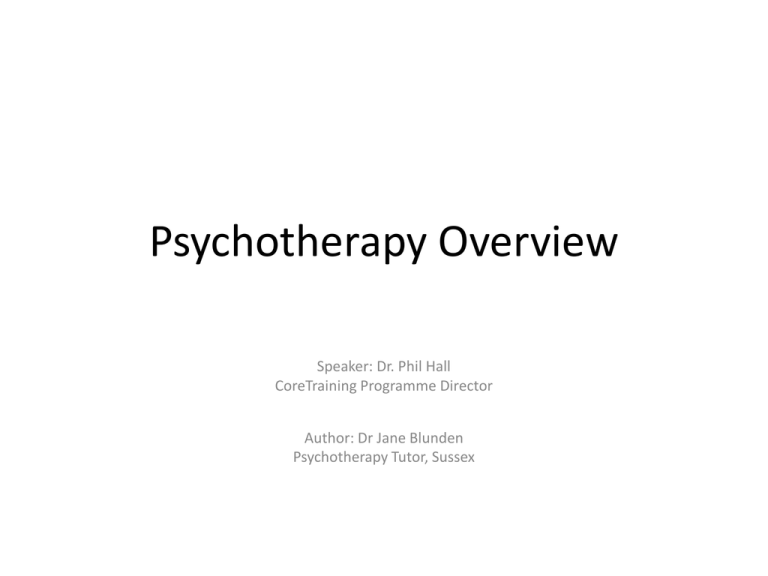
Psychotherapy Overview Speaker: Dr. Phil Hall CoreTraining Programme Director Author: Dr Jane Blunden Psychotherapy Tutor, Sussex Royal College Requirements • The Royal College has made it an absolute requirement for core trainees in psychiatry to complete basic psychotherapy training • Trainees will need to have attained satisfactory psychotherapy competencies in order to pass their ARCPs, and crucially to have completed them by the end of CT3 to be eligible for higher training Why? • It’s better for patients • It’s better for psychiatrists Advantages for patients • Psychiatrists who have a good understanding of psychotherapy and of therapeutic relationships listen better, understand better and react better • “Better” includes with knowledge (of human psychological development and of the complexities of emotional life) and with emotional attunement Advantages for psychiatrists • Completing the competencies won’t make you into a psychotherapist; but it will make you more likely to be able to refer appropriately • A therapeutic relationship, like any relationship, has two people in it. Becoming aware of what you bring to it is important, and includes learning to look after your own emotional needs and sensitivities within that Advantages for psychiatrists • Discovering whether or not you’d like to take it further. Some trainees go on to do a training in one or other type of psychotherapy and hence do become therapists as well as psychiatrists • Some trainees decide to have a personal therapy at some point in their training, whether or not they train as therapists themselves The core training requirements 1. Balint groups (30 sessions minimum) And to undertake a minimum of two psychotherapy cases under expert supervision, of different modalities and different lengths 2. One short case (duration up to 6 months, or 12 to 20 sessions) 3. One long case (duration 9-12 months, or 3040 sessions) Balint groups • These are groups in which one trainee volunteers to present either a case they have seen, or an incident in which they have been involved. • The group conductor helps the group members think about the psychological content of the material, including the group members’ own emotional reactions • They are a good way to introduce trainees to ‘thinking psychologically’, and to continue to develop their skills as time goes on Supervised cases • All supervisors have to be a trained therapist in the type of therapy (modality) being used, and to continue to be a practitioner of that therapy themselves. • Choosing appropriate cases for therapy for psychiatry trainees is a complex task in itself; try and let your supervisor or psychotherapy tutor do this for you Supervised cases • Long cases: a psychodynamic case is usually done as a long case (because the longer the therapeutic relationship is, the more issues of transference and counter-transference come to the fore) • Short cases: often either cognitive behavioural therapy (CBT); cognitive analytic therapy (CAT); interpersonal therapy (IPT); or any other type of therapy available locally • Other combinations are possible eg a long CBT case and a short psychodynamic case Assessments • Your Balint Group Conductor will need to do a psychotherapy CBD (case based discussion) assessment for you after each 6 month block • The supervisor of each of your cases should be asked to do a SAPE (structured assessment of psychotherapy expertise) twice: one mid-way and one after completion • Finally, you should do a PACE (psychotherapy assessment of clinical expertise) with a suitable person (often the psychotherapy tutor) How to do all this? • Contact your psychotherapy tutor and let them know who you are and where you are. Kent: currently vacant, contact DME Surrey: Sean Fernandez Sussex: Jane Blunden • Find out where your local Balint group is, and attend regularly • When ready, seek a supervisor to do a case Finally: Enjoy!
